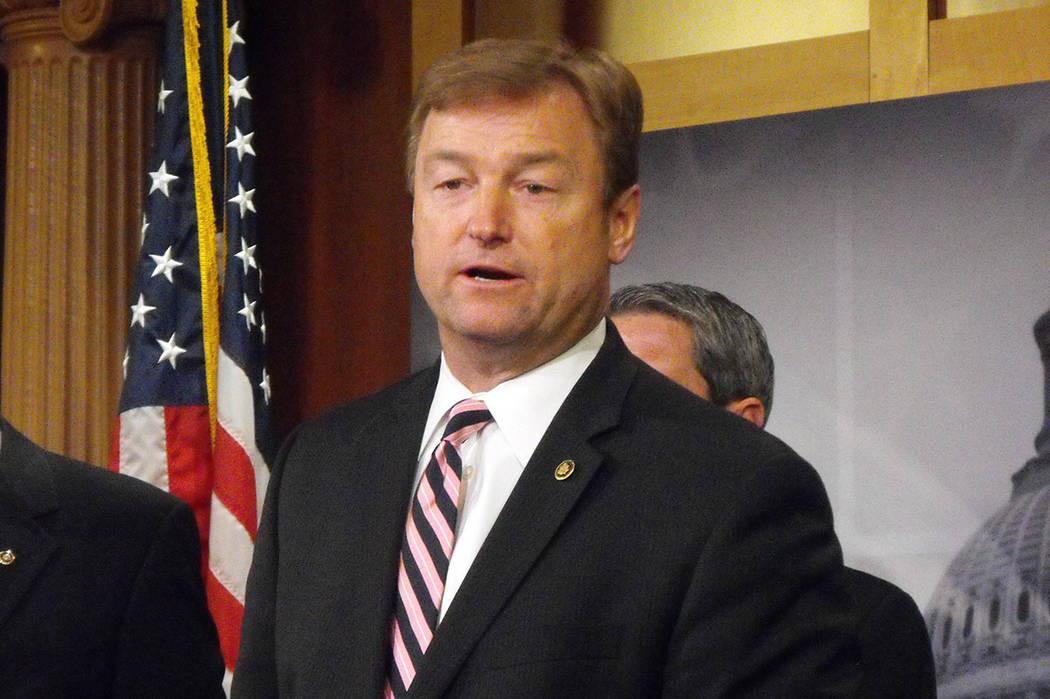President Trump signs sweeping overhaul for veterans
WASHINGTON — Sweeping legislation to reform the U.S. Department of Veterans Affairs, fund improved programs that serve millions of vets nationwide, including roughly 300,000 in Nevada, was signed into law Wednesday by President Donald Trump.
The president signed the $52 billion bipartisan bill during a Rose Garden ceremony attended by lawmakers and representatives of veterans groups that supported the legislation and the overhaul of the veteran health care system.
“You fulfilled your duty to our nation with tremendous loyalty and courage,” Trump said.
By signing the legislation, Trump said, “we take one more crucial step in fulfilling our duty to you.”
Trump signed the bill on the 74th anniversary of D-Day and he acknowledged the veterans who invaded Europe in World War II at great cost.
The bill, the VA MISSION ACT, passed with overwhelming support in the Senate, 92-5, and in the House, 347-70. Both Nevada’s senators and most of the congressional delegation voted for the bill.
Only U.S. Rep. Dina Titus, D-Nevada, voted against the bill. She said the reforms put “the VA on a path to privatization that hurts our veterans and their families.”
But U.S. Sen. Jon Tester, D-Montana, who helped write the bill, called the current VA Choice system “a wreck.” Tester said reforms called for in the new law would be the best defense against privatization.
U.S. Sen. Johnny Isakson, R-Georgia., chairman of the Senate Veterans’ Affairs Committee, said the bill streamlines community care programs, improves health care delivery and expands caregiver programs.
U.S. Sen. Dean Heller, R-Nevada, agreed with Tester that that Choice Program failed to serve veterans. He said the new VA MISSION law provides changes to better serve veterans, particularly those in rural areas.
Nevada chapters of the American Legion and Veterans of Foreign Wars supported the bill.
The bill also expands caregiver programs to serve those injured while in service before Sept. 11, 2001, the current cutoff date for existing programs due to budgetary restraints.
Heller, a member of the Senate Veterans’ Affairs Committee, was part of a bipartisan coalition that included U.S. Sens. Patty Murray, D-Washington., Susan Collins, R-Maine, Sidney Blumenthal, D-Connecticut., Isakson, Tester and others who wrote the legislation.
Provisions on liver transplants, VA performance reviews and a pilot program to free up doctors from data entry were tucked into the bill by Heller, who attended the White House signing ceremony with other lawmakers who helped write the law.
“Our veterans deserve to know that our nation will support them when they return from the frontlines, and that’s what this bill is all about,” Heller said.
In the House, Titus said she was concerned with a provision in the bill to create a commission to recommend closing and consolidating clinics and facilities in underserved communities. She said any closures would be bad for Las Vegas, which faces a shortage of doctors and nurses.
Other critics of the bill scoffed at the whopping $52 billion price tag.
Tester and Isakson dismissed criticism of the cost of the bill.
“Taking care of veterans is the price of war,” Tester said.
Contact Gary Martin at gmartin@reviewjournal.com or 202-662-7390. Follow @garymartindc on Twitter.
The VA MISSION Act of 2018
Streamlines VA community care programs
- Consolidates seven community care programs into one
- Allows access to walk-in clinics for enrolled veterans
- Removes the 30-day/40-mile rule that allowed outside care depending upon appointment time or distance to a facility
- Creates standards for timely payments to community care providers
Improves VA health care delivery
- Allows VA professionals to practice telemedicine
- Provides resources to hire and retain VA professionals
- Establishes mobile deployment teams for underserved rural facilities to provide specialized care
Expands caregivers program
- Extends eligibility for the VA caregiver program to veterans of all generations, not just those after Sept. 11, 2001
- Requires VA to implement a technology system to support, assess and monitor the program
Source: Senate Veterans' Affairs Committee















